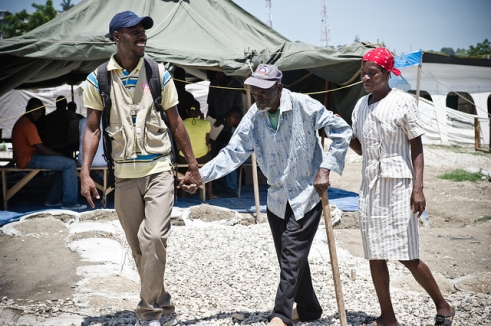
The Haitian Ministry of Public Health and Population (MSPP) has reported that as of 14 November, 17,418 hospitalised admissions and 1,065 deaths were recorded in the country.
An increase in the number of cases is reported from several communes of the country’s capital, Port-au-Prince. Reported incidents of death have fueled concerns that the epidemic will continue to spread through the crowded camps where the poor sanitation conditions puts those left homeless after January’s earthquake at a higher risk.
HelpAge International has deployed over 200 staff and volunteers to eight communes in Port-au-Prince to work in cholera prevention with at-risk communities. These include nurses, community support workers and volunteer home-based carers.
HelpAge is also working on cholera prevention messages on a network on eight radio stations which will reach five million listeners.
Public health and hygiene training
Ndaro Essaba, HelpAge’s health coordinator in Haiti says:
“We have provided training to all our camp volunteers, the staff in CENSHOP (the hospital we support) and nursing home staff so they can recognise the signs and identify what action to take. This mostly involves getting the patient to a treatment centre as soon as possible.
“We will also broadcast public health and hygiene messages on the radio show and our volunteers have been disseminating the same messages to the older people in the camps. These include messages about hand washing, boiling water, food preparation and so on.
“So far only one older person has been transported to a treatment centre and is recovering.”
Older people’s vulnerability to cholera
There is a suggestion that older people are more likely to become infected. This is because – like infants and children – they have lower levels of the stomach acid that tends to kill the bacteria that cause food and water borne diseases.
However, there is also evidence that in stressful situations, such as an emergency, stomach acid levels rise, providing additional protection against food and water borne infections.
Ndaro Essaba explains:
“Unfortunately there is very little research data on older people in communicable disease outbreaks. Epidemiological surveillance tools from the World Health Organization do not disaggregate data on cholera and other communicable disease outbreaks to show the attack rates of older people.
“Typically they disaggregate only the number of children under five. There is no such data on the risk for other age groups including older people.”
